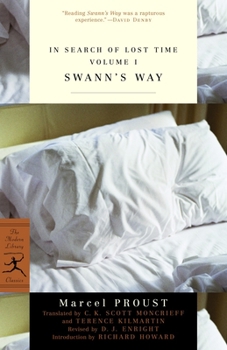Swann's Way
Select Format
Select Condition 
Book Overview
In Swann's Way , the themes of Proust's masterpiece are introduced, and the narrator's childhood in Paris and Combray is recalled, most memorably in the evocation of the famous maternal good-night kiss. The recollection of the narrator's love for Swann's daughter Gilberte leads to an account of Swann's passion for Odette and the rise of the nouveaux riches Verdurins. For this authoritative English-language edition, D. J. Enright has revised the late...
Format:Paperback
Language:English
ISBN:0375751548
ISBN13:9780375751547
Release Date:June 2003
Publisher:Modern Library
Length:656 Pages
Weight:1.09 lbs.
Dimensions:1.3" x 5.2" x 8.0"
Customer Reviews
3 ratings
At last! A readable copy.
Published by Thriftbooks.com User , 16 years ago
This is not a literary review (We all know what Swann's Way is about), but my way of expressing relief that at last I have a readable copy of it. Out goes my old Folio paperback with its miniscule print -- Hooray!
Proust the Yenta
Published by Thriftbooks.com User , 18 years ago
When I first read this novel 35 years ago, I found a button in a head shop that read, "PROUST IS A YENTA." It's true. Proust is, underneath all the vivid and evocative prose, a fellow who loves to dish the dirt, and the more sordid the better. Poor Swann! In love with a two-timing hussy who takes him for all he's worth and alienates all his haute-bourgeois friends in the process. Amazing the lengths Proust goes to to tell this simple tale! No metaphorical stone goes unturned (as it were), no perfervid phrase unused, no nuance of ratiocinated feeling unnoticed. If you are a Proust neophyte, understand that single sentences sometimes go on for more than a page and that paragraphs often take multiple pages to unfold -- that every diamond has infinite facets and all are examined. Only late Henry James rivals Proust in the complexity of his sentence sructures which seek to eke out the essence of the quintessence of feelings. The effete narrator (for truly he defines the word "effete") spends the first 150 pages of the novel dissecting nostalgia for his childhood. Only after these rarified ramblings does he deign to tell us poor Swann's story! Well, no one reads Proust for the tales. Either you'll think he's the greatest stylist of any language ever, or you'll stop reading after the first page. You may need a large dose of Elmore Leonard after reading Proust just to cleanse the palate! Still, there's nothing quite like it.
A challenge and a pleasure at the same proportion
Published by Thriftbooks.com User , 18 years ago
To read Marcel Proust's "Remembrance of Things Past" is a pleasure and a challenge in the same proportion that any brave read can have. Not only is it a hard task, but also a very pleasant one. The books are written in such a way that readers are transported to another time and place, and get to know the characters as if they were old friends of ours. Of course, if it weren't like that, not many people would dare to try and read the seven novels that compound the whole series. But Proust is a master to keep your interested glued to his words. Even when this words are in a paragraph that lasts four pages. "Swann's Way" is the first novel and it is a blessing and a curse at the same time. It is good because everything is new to us, so the `nameless' narrator takes his time to explain a lot of things, introduce people, describe places and the action is built up bit by bit. On the other hand, the reader is not used to Proust style and when we come across a paragraph that lasts four pages we get scared. To make things more complicated, when he was writing "Remembrance of Things Past" Proust wanted to make a novel, but he also wanted to philosophize. Therefore, there is a lot of philosophy in his books. At first this device seems to be difficult to understand, to get the gist, but with time, one gets used to it, and is able to realize that we're not supposed to read this books in the same way we read any other novel. Proust's work is about senses. He does not expect you to understand everything he is saying. His narrative is not cumulative. What he wants, in fact, is to make his reader feel what he was saying, to feel things like time passing through our lives and its effects on our memories. Bearing this in mind, any reader is able to focus on the poetic narrative and the author's idea rather than understanding the events. Of course there is a plot in the book, but there are things that are more important to produce the effect Proust wanted. "Swann's Way" begins with the `nameless' narrator remembering experiences from his childhood in Combray. But the largest section of the novel is not about him, but about Swann, a friend of his family. Fifteen years before the events described in the first part, Swann felt in love with Odette, a woman with a terrible reputation. And this love affair will affect his life forever. Despite Proust's language being evocative, it is not difficult to understand his sentences. His work is replete of references and allusions, mostly to visual arts, namely painting. Some descriptions are like the works of Monet and Botticelli. The writer also has interest in literature. The main character relationship to his mother echoes works as "Oedipus Rex". Qualities like these make "Remembrance of Things Past" one of the most important works produced ever. With his caldron of references, ideas and images, Proust has created one of the most beloved works from the XX Century. It is certain that this series of books will be read







